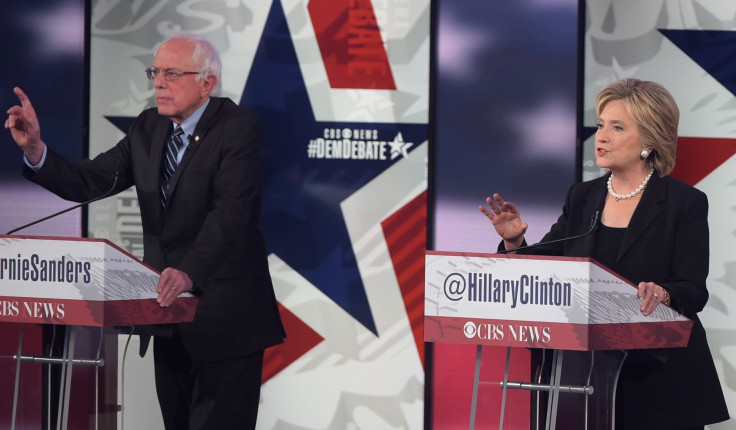Hillary Clinton Wall Street Controversy: 9/11 Terrorism Attacks Required Close Relationship With Financial Industry, She Claims

When asked about Vermont Sen. Bernie Sanders' criticism of her campaign contributions from Wall Street, former Secretary of State Hillary Clinton argued that Wall Street "knows" she will regulate them, touting her "comprehensive, tough plan" to regulate Wall Street and the shadow banking industry. She also referenced Sept. 11 when speaking about her donor base, using the tragic terrorist attacks to defend her Wall Street donations, drawing a backlash from users on Twitter. The former secretary of state argued that she had worked with Wall Street in order to rebuild New York City and Wall Street after 9/11.
"Not good enough," Sanders said in reaction to Clinton's description of her plan to reign in big banks. He acknowledged that he is the only candidate without a super PAC and promised that he would break up the big banks and reinstate the Glass-Steagall Act.
Sanders acknowledged that Wall Street controls consumer finance, and said he wants to see credit unions and community banks more involved in finance. Clinton fired back, accusing Sanders of trying to "impugn" her integrity. "Wait a minute, senator," she said. "You know, not only do I have hundreds of thousands of donors, most of them small -- and I’m very proud that for the first time, a majority of my donors are women. 60 percent. I represented New York, and I represented New York on 9/11. When we were attacked, where were we attacked? We were attacked in downtown Manhattan, where Wall Street is. I did spend a whole lot of time and effort helping them rebuild. That was good for New York. It was good for the economy. And it was a way to rebuke the terrorists who had attacked our country."
good for @CBSNews for calling @HillaryClinton on that 9/11, Wall St donations link #DemDebate
— Peter Beinart (@PeterBeinart) November 15, 2015
Hillary Clinton mentioning 9/11 in the context of defending the banks is a cheap political trick. That's a Republican move. #DemDebate
— Cenk Uygur (@cenkuygur) November 15, 2015
Hillary says she helped Wall Street rebuild after 9/11 as proof she is not controlled by Wall Street.
Huh? #DemDebate
— Roger Simon (@politicoroger) November 15, 2015
Ew, EW to Hillary invoking 9/11 to talk about her relationship with Wall Street?? That's what just happened right? #DemDebate
— Molly Knefel (@mollyknefel) November 15, 2015
Sanders argued candidates need to show by example and not rely too heavily on corporations and Wall Street donors. Employees of five large financial firms gave about $290,000 to Clinton's campaign committee through June 30, according to a MapLight analysis of Federal Election Commission data, CNBC previously reported.
Clinton, Sanders and Maryland Gov. Martin O’Malley--the three remaining candidates in the Democratic field--took the stage Saturday night at Drake University in Des Moines, Iowa. The contenders disputed over a variety of topics, from the recent terrorist attacks in Paris to income inequality and the economy.
The Democratic contenders hold somewhat varied views on leading economic issues. Clinton's campaign has reportedly promised not to increase taxes on the middle class, but corporations and banks will see their taxes increase, according to CNNMoney. Sanders has laid out more specific plans, that include increases in corporate taxes, as well as at least one tax increase that will affect everyone; a .02 percent payroll tax to finance family leave. O'Malley also supports boosting taxes for the rich. Sanders and O'Malley support an increase in the minimum wage to $15 an hour, and while Clinton agrees that the minimum wage should be lifted, the amount would vary based on the location. All three candidates support plans that would ease tuition costs and student loan burdens.
Prior to the debate Saturday night, Clinton had a wide lead in the race with 52 percent of support from primary voters, according to a CBS News/New York Times poll released Thursday; Sanders had 33 percent and O’Malley had garnered 5 percent. Roughly 54 percent of Clinton’s supporters said their minds were completely made up, while 58 percent of Sanders’ supporters said they had not made a final decision yet.
The debate was moderated by CBS’ “Face of the Nation” anchor John Dickerson. CBS’ national congressional correspondent Nancy Cordes also served as a panelist, along with local journalists Kevin Cooney of KCCI and the Des Moines Register’s Kathie Obradovich.
The debate aired at 9 p.m. EST on CBS and was scheduled to last for two hours. The next Democratic debate is scheduled for Dec. 19 in Manchester, New Hampshire.
© Copyright IBTimes 2024. All rights reserved.





















